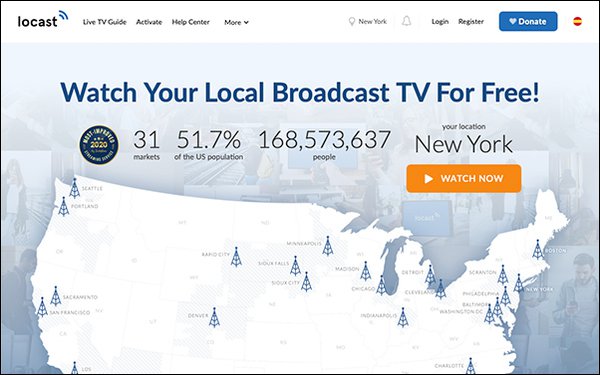
Streaming service Locast suspended operations Thursday
morning, after losing a key battle in a copyright infringement lawsuit brought by television broadcasters.
The company's move came just two days after U.S. District Court Judge Louis Stanton
in the Southern District of New York said Locast didn't qualify for a
provision in the copyright law that carves out an exemption for some nonprofits.
"As a non-profit, Locast was designed from the very beginning to operate in accordance with the strict letter
of the law, but in response to the court’s recent rulings, with which we respectfully disagree, we are hereby suspending operations, effective immediately," the company tweeted Thursday morning.
advertisement
advertisement
Locast, created by the nonprofit Sports Fans Coalition NY, captures over-the-air broadcast signals
and streams them over the internet to users who live within specific geographic areas. The company launched in 2018 with broadcast feeds from 13 stations in the New York City area, and later expanded
to include feeds from more than 30 markets.
The major broadcasters sued Locast in 2019, claiming the company was infringing copyright by transmitting programs without licenses. The
broadcasters noted in their complaint that Locast had received a $500,000 donation from AT&T, and that its founder, David Goodfriend, is a former Dish Network executive.
The broadcasters
also claimed that Locast helps Dish and AT&T in several ways, including by
enabling them to “gain leverage in negotiations with broadcast stations.”
Later in 2019, the broadcasters and Locast entered into a then-confidential agreement to limit the scope
of their legal battle to Locast's argument that it is protected by a provision in the Copyright Act that allows nonprofits to boost antenna signals. (Stanton recently ordered that agreement
unsealed.)
That Copyright Act provision only applies to nonprofits that don't charge for service -- though it allows nonprofits to charge fees necessary to cover costs of maintaining the
service.
Locast argued that its service was free, but the broadcasters countered that the company solicits $5 monthly donations, and interrupts non-contributing users' streams every 15
minutes.
Stanton said in his ruling that the service wasn't actually free, due to those interruptions.
“The obvious economic fact is that these 'donations' are really a
scale of fees for uninterrupted service, and it works,” he wrote in an 8-page order. “At present, Locast is almost fully funded by payments from users.”
He also said that the
revenue collected was more than Locast needed to offer service, writing that the company took in $4.5 million in revenue in 2020, with more than $4.3 million coming from users, while the company's
operating expenses were just $2.4 million.
“On those undisputed facts, in 2020 Locast made far more money from user charges than was necessary to defray its costs of maintaining and
operating its service,” he wrote.
The 2019 agreement between Locast and the broadcasters also provided that Stanton should “immediately” enter a permanent injunction that
would require Locast to be shut down, if he decided the company did not qualify for the Copyright Act's nonprofit exemption.
The agreement also allows Locast to appeal, and also provides that
the networks won't seek damages of more than $10,000 per infringed work.
On Wednesday, the broadcasters cited that agreement in a motion asking Stanton to enter an injunction shuttering
Locast. That request is still pending.
It's not yet clear whether Locast plans to fight the formal request for an injunction, or if it plans to reconfigure its service and attempt to resume
operations.
On Wednesday, before announcing the suspension of operations, Locast stopped interrupting streams
to solicit donations.